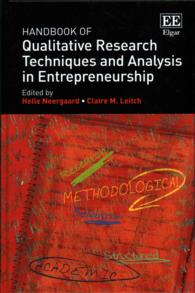- ホーム
- > 洋書
- > 英文書
- > Psychology
基本説明
Focuses on the methodological challenges facing contact researchers and provides new directions for research into reducing prejudice and conflict between groups.
Full Description
Intergroup contact remains one of the most effective means to reduce prejudice and conflict between groups. The past decade has witnessed a dramatic resurgence of interest in this time-tested phenomenon, with researchers now focusing on understanding when, why, and for whom contact does (and does not) work.
This new volume focuses on one of the hottest topics in the social sciences: prejudice. Covering not only basic principles but cutting-edge findings and theoretical directions, key questions surrounding this subject are addressed, such as:
how perceptions of other groups lead to anxiety and avoidance;
how cross-group contact influences the development of prejudice in children;
whether highly-prejudiced people benefit from contact;
how status and power influence the effectiveness of contact.
In addition to exploring methodological challenges facing contact researchers, attention is devoted to prejudice interventions that are rooted in our understanding of contact effects. These range from zero-acquaintance contact to intimate cross-group friendships, and even involve simulated contact experiences.
This volume draws together world-renowned experts in prejudice and intergroup contact to provide a long-awaited update on the state of affairs in intergroup contact research. As well as synthesizing and integrating the key topics, it also provides possible new directions for future research. Given the prominence of contact as a powerful prejudice-reduction tool, this book is a must-read for students and scholars of social psychology and sociology, as well as policy-makers and practitioners.
Contents
Part 1: Introduction. G. Hodson, M. Hewstone, Introduction: Advances in Intergroup Contact. Part 2: Potential Obstacles to Positive Intergroup Contact and Directions for Circumvention. J. D. Vorauer, Getting Past the Self: Understanding and Removing Evaluative Concerns as an Obstacle to Positive Intergroup Contact Effects. G. Hodson, K. Costello, & C. C. Macinnis, Is Intergroup Contact Beneficial Among Intolerant People? Exploring Individual Differences in the Benefits of Contact on Attitudes. S. Lolliot, K. Schmid, M. Hewstone, A. Al Ramiah, N. Tausch, H. Swart, Generalized Effects Of Intergroup Contact: The Secondary Transfer Effect. T. Saguy, L. R. Tropp, D. Hawi, The Role of Group Power in Intergroup Contact. Part 3: Building Intimacy in Intergroup Contact: Preludes and Processes. R. J. Crisp, R. N. Turner, Imagined Intergroup Contact: Refinements, Debates and Clarifications. T. V. West, J. F. Dovidio, Intergroup Contact across Time: Beyond Initial Contact. F. E. Aboud, C. S. Brown, Positive and Negative Intergroup Contact among Children and its Effect on Attitudes. K. Davies, S. C. Wright, A. Aron, J. Comeau, Intergroup Contact through Friendship: Intimacy and Norms. Part 4: Methodological Concerns and Future Considerations. O. Christ, U. Wagner, Methodological Issues in the Study of Intergroup Contact: Towards A New Wave of Research. G. Hodson, M. Hewstone, H. Swart, Advances in Intergroup Contact: Epilogue and Future Directions.






